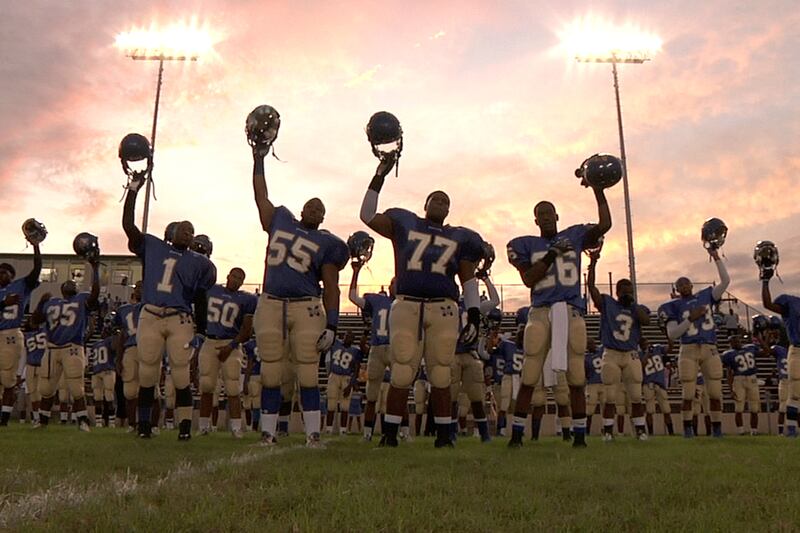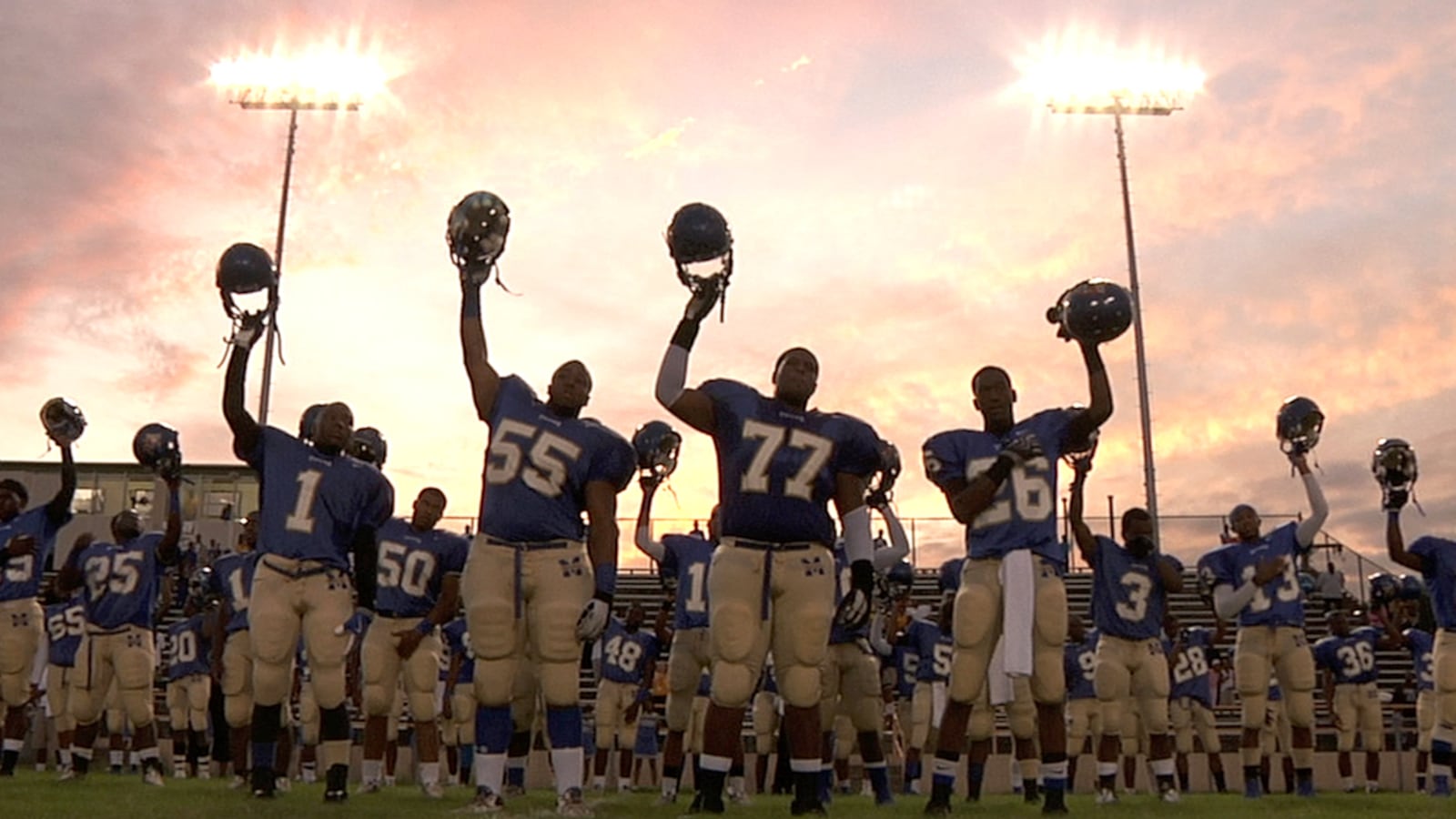Now that “Tebowing” has given way to “Linsanity,” and Brazilian Barbie is no longer licking Ken’s Super Bowl tears, those jonesing for a football fix should look no further than the crowd-pleasing Oscar-nominated documentary Undefeated, which opens in select theaters on Feb. 17.

Directed by Daniel Lindsay and T.J. Martin, Undefeated is the real-life version of NBC’s acclaimed drama Friday Night Lights—albeit twice as poignant. The film chronicles the 2009 high-school football season of the Manassas Tigers, a ragtag bunch of inner-city black kids from a destitute section of Memphis that used to be the crime capital of America. Since its founding in 1899, the Manassas football team had never won a playoff game, and in recent years, even resorted to participating in “pay games” where their squad was bused to richer schools several hours away to get their asses kicked in exchange for a few thousand dollars, which would then be funneled back into the underfinanced Manassas football program.
In stepped Bill Courtney, who joined the school as coach in 2004, and immediately changed the culture. He starting Manrise, a booster club to help fund the football team, ending the embarrassing “pay games”; convinced a group of talented eighth-grade players to stay in town and play ball at Manassas; and mentored his troubled kids on and off the field. Coach Bill’s efforts finally paid off in 2009. His gifted eighth-grade recruits—led by O.C. Brown and overachiever Montrall “Money” Brown at the offensive-tackle positions—are now seniors, and Manassas has finally fielded a team with the potential to win the school’s first playoff game ever.
Co-directors Lindsay and Martin were first drawn to the story of Manassas when their lead producer, Rich Middlemas, found an article online about O.C. Brown, a blue-chip college prospect living with the family of one of his affluent white coaches so that he could be tutored and keep playing football. The three were all big fans of Michael Lewis’s nonfiction tome The Blind Side, and felt that book would have made a gripping documentary. Now was their chance.
“We had been living in Memphis filming our movie and I had a meeting with Alcon and they said, ‘Oh, we’re doing this movie, The Blind Side. We just cast Sandra Bullock,’ ” said Lindsay. “They filmed the movie, it came out, Sandra Bullock won an Oscar, and we were still in Memphis filming our movie.” He chuckles. “I guess that’s the difference between Hollywood and docs!”
The filmmakers remained undeterred, and while their initial conceit was that of a Blind Side-esque saga tackling race, religion, class, and one star’s struggle to overcome a litany of obstacles, they eventually found that, despite allegations that the film recklessly ignores matters of race and religion levied by The Wall Street Journal and the New York Post, those hot-button issues didn’t play a big role at Manassas.
“We were like, ‘Why is O.C. living with Mike? What is his angle?’” said Martin. “We wanted to focus more time on that but it just wasn’t an issue. Same with Bill being a white coach at an African-American school.” Adds Lindsay, “We also asked Bill, ‘Isn’t it weird for people to be praying before games?’ And he said, ‘This is the South. If you tried to change it, you would be run out of town.’ It wasn’t an issue. If we had made it an issue it would have been irresponsible of us.”
During their first trip to Memphis, the filmmaker met Coach Bill as well as “Money,” and decided to broaden the scope of their film, picking individuals with the greatest potential for change, or those overcoming the biggest obstacles. They settled on O.C., “Money,” an undersized offensive tackle with a big heart boasting a 3.8 GPA who hopes to get a scholarship to attend college, and junior linebacker Chavis Daniels, who had just returned form serving 15 months in a youth penitentiary on account of his extreme anger issues. Still, Coach Bill had his reservations about turning the cameras on his team of resilient young men.
“When these Southern California guys first showed up wearing goofy socks and straight-legged jeans, you kind of took it with a grain of salt,” Coach Bill told The Daily Beast. “But when they moved here, it became pretty evident they were serious about telling our story.”
Lindsay, 33, and Martin, 32, met in 2007 when they were both hired to work on a documentary on the World Series of Beer Pong. For Undefeated, they spent nine months living in Memphis and filmed every practice, game, late-night film study, and even graduation and prom. They also helped teach a film class at Manassas in their spare time and, according to Coach Bill, soon became a part of the community and the team. Eventually, the duo amassed about 500 hours of footage, and it took the two young filmmakers about nine months to edit it into a 113-minute documentary.
According to the filmmakers, the 1989 Civil War film Glory served as a big influence for their documentary since both films trace the individual storylines of several characters overcoming major obstacles, while also focusing on the unit as a whole.
“Chavis was Denzel, O.C. is the guy who’s not the brightest but the good shot, ‘Money’ is the guy with the glasses, and Bill is Matthew Broderick!” said Martin. “The funny thing too with that movie is everyone’s personal storyline is wrapped up before the last battle. We stole that.”
In addition to the players, a large portion of the film is dedicated to the story of Coach Bill, who grew up in a fatherless household and serves as a father figure of sorts for many of his fatherless players. He’d get to work at his lumber business at 5:30 a.m., leave at 3 p.m. to coach practice, and then study film all night after. Overall, he estimates that he spent about 50 hours a week working on his day job, and another 50 hours a week coaching the team. Eventually, it takes a toll on Coach Bill, and he decides to leave Manassas after their memorable 2009 season.
“It was harder on my family than it was on me, frankly, and that’s why I made the decision after the sixth year to step down,” said Coach Bill. “When one of your kids asks your wife a question and your wife says, ‘Why don’t you ask Dad?’ And they say, ‘Oh, he’s too tired. I don’t want to bother him with that,’ then you realize you need to check your priorities.”
Undefeated received a surprise Academy Award nomination for best documentary, which led to musician-cum-entrepreneur Sean “P. Diddy” Combs coming onboard as an executive producer, as well as a Hollywood remake that distributor The Weinstein Company has in the works. The film—and filmmakers—also found themselves caught in the middle of a controversy, however, when it was nominated over other lauded docs like Senna and The Interrupters, since it hadn’t been released yet. For their part, the newcomers are a bit befuddled by the Academy’s inner workings.
“The voting process does seem like it’s almost working against filmmakers, in a way,’ ” said Lindsay. “I loved Senna, and we also went and saw The Interrupters opening day and loved it. Project Nim didn’t get nominated, which was incredible.”
“The Interrupters and Hoop Dreams are two of the most amazing documentaries ever,” Martin adds. “I would be thrilled to see [director] Steve James finally get recognized. They should literally create an award called, ‘Oops! We f--ked up in 1994. Here’s your Oscar.’”
Despite the controversy, Undefeated is certainly worthy of its Oscar nomination. It’s the best sports documentary since 2005’s Murderball, and hopes to be the first to win the Oscar since the 1996 documentary When We Were Kings, which told the story of the famous “Rumble in the Jungle” heavyweight-boxing match between Muhammad Ali and George Foreman. It’s an underdog saga of the first order, and one can’t help but root for these courageous young men to overcome the odds.
“I made one deal with them: ‘For better or worse, whether you like what you see or not, you tell the truth,’ ” said Coach Bill. “And after the first showing at South-by-Southwest, Chavis and I were standing off to the side and Dan walked up, and Chavis had tears running down his face and he said, ‘You’ve got it right.’ ”





